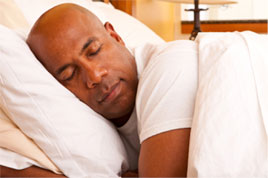How You Can Get a Better Night's Sleep
Despite common belief, aging doesn't cause sleep problems, and seniors don't need less sleep as they grow older.
Most older people sleep poorly, or not long enough, because of ailments associated with aging, such as arthritis, physical disabilities, respiratory problems and depression.
Lack of exercise, heart disease, anxiety, stress and menopause also can disrupt sleep, and many medications seniors take can cause insomnia.
Changing patterns
"Many people believe that sleeping poorly is just part of growing old. In fact, seniors who fall asleep during the day do so because they aren't getting enough quality sleep at night," says Sonia Ancoli-Israel, M.D., director of the Sleep Disorders Clinic at the San Diego Veterans Affairs Medical Center in California.
Did You Know?
 There are thousands of health videos that educate on topics from allergies to getting your zzzzs.
There are thousands of health videos that educate on topics from allergies to getting your zzzzs.
Log-in to check them out...
Though the need for eight hours of sleep each night doesn't change with age, sleep patterns do. The body's circadian rhythm, a biological clock that controls sleep, naturally advances a few hours as a person grows older. When that happens, older people may feel sleepy earlier in the evening and wake up earlier in the morning. By observing their natural sleep patterns and making lifestyle changes, seniors can help keep their internal clocks on time and overcome sleep problems.
Sleep remedies
Sleep and aging experts agree that one's daytime activities and sleep environment are critical to getting a good night's sleep.
Try the following remedies if you have trouble sleeping.
- Stick to a regular sleep schedule. Try to go to bed and get up at the same time every day.
- Ask your doctor if any of your medications could be disturbing your sleep.
- Stay active. Maintain a moderate level of daily activity and do gentle exercise.
- Spend some time outdoors during daylight hours. Sunlight can help set your biological clock.
- Pay attention to what you eat and drink in the evening. Consuming foods and drinks that contain caffeine, such as coffee, tea or cola can interfere with nighttime sleep.
- Avoid alcoholic beverages in the evening. They can make you fall asleep faster, but they cause early morning awakenings and fitful sleep.
- Don't smoke. Smokers are more likely to have trouble sleeping than nonsmokers.
- Make sure your bedroom is dark, quiet and cool.
- Replace your mattress if it's lumpy, sagging or worn out. A comfortable mattress that offers good support can help you fall asleep and stay asleep.
- Ask a doctor for help if your partner snores or has an illness that disturbs your sleep.
The StayWell Company, LLC © 2020
Fixing Our Broken Sleep
Presented by: Rick Clerici
In this webinar, you will learn techniques for overcoming common sleep problems like "trouble falling asleep", "difficulty staying asleep", "excessive thinking", "waking too early", "Sunday night insomnia", "chronic insomnia" "shift-work difficulties" and "daytime sleepiness". You will hear about the latest population studies and the latest scientific discoveries of the foundational relationship between sleep and all areas of health. This hands-on presentation has helped many people to begin getting better sleep almost immediately. Guided relaxation exercises teach techniques for initiating sleep and returning to sleep.
Log-in any time this month to watch the webinar and ask the expert questions!


 There are thousands of health videos that educate on topics from allergies to getting your zzzzs.
There are thousands of health videos that educate on topics from allergies to getting your zzzzs.